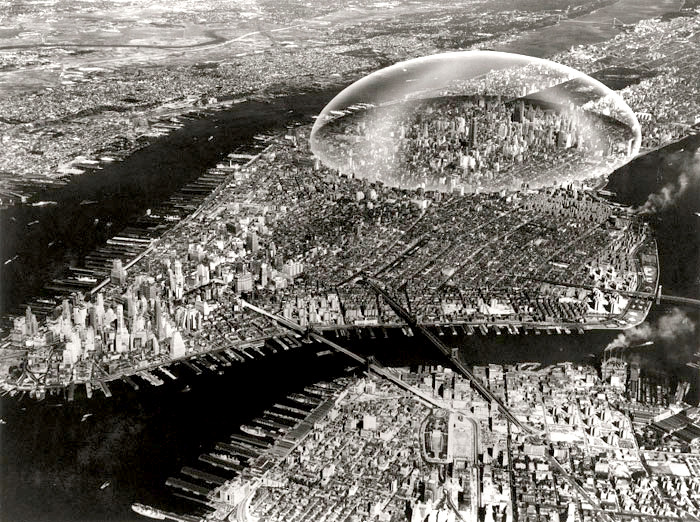
Mar '12 - Apr '15
When the question, "what's your thesis?" comes up, elaborating on the topic of atmosphere usually results in an obscure conversation about what atmosphere is exactly. How do you develop an architectural provocation based on something apparently immaterial, and for the most part, invisible? As a parallel point of departure, architecture as a discipline is struggling, and little of it, in my opinion, is due to the state of the economy. The service-oriented practice has been perpetually whittled away through value engineering, cost-cutting, and hyper-quantification of objective aspects of design. Perhaps, this is the idealist graduate student perspective coming out, but what are we studying for if not to disrupt status quo operations of the discipline?
Which brings us to atmosphere. As a clarification, 'atmosphere' and its use throughout this research is focused on architecture's responsibility for articulating the interior through moderation of temperature, humidity, and ventilation [in short, air conditioning], and is not to be confused with 'the atmosphere' as a global/environmental qualifier. Climate-control as a sub-category of architectural production is grossly overlooked, despite the power it has over the human subject in space. Let's imagine an extreme example: you walk into a museum, whose spaces are of pleasant proportions, whose walls are clad with the finest materials. If the temperature is sweltering and the humidity is enough to cause instant perspiration, the atmosphere is likely to have a more indelible effect on the memory of this place than the building's material conditions. You'll be lamenting not bringing along your handkerchief instead of absorbing, questioning, appreciating the physical environment of the space.

[above] Dome over Manhattan, by Buckminster Fuller
[below] Blur Building, by Diller Scofidio + Renfro

The research provocation is in large, a response to the historical binary of architectural conceptions of atmosphere as either hermetically sealed representational tool for understanding the Earth's environment [Bucky Fuller's Dome over Manhattan comes to mind], or an emphasis on the affective qualities of the immaterial as sensorial stimulus [Blur Building]. Though the discourse on atmosphere has shifted between and around these two positions, my research is searching for a middle ground; an urban scenario in which the spaces outside of the home [typically hermetically-sealed] adopts atmospheric manipulation as a way to provoke activity or event. In other words, If climate-control is one of the few non-negotiable aspects of articulating space, how might we use this to generate new conditions beyond the interior?
Numbered posts refer to my current thesis research at the University of Michigan entitled "The Middle: Atmospheres of Control"
Now that I'm post-graduate-school, and [for the time being] post-architectural-practice, I'm using this blog as an outlet to generate meaningful conversation on the limitations as well as latent opportunities in architectural practice. Co-Founder @anewyorkagency



5 Comments
First thing that comes to mind is "Thermal Delight in Architecture", as an interesting reflection on sensory conditions in relation to articulating program within architectural space (similar to your "provok[ing] activity or event"). It's a slim book, a quick read, but actually really interesting. Hope it's a help.
It does look interesting, I'll definitely check it out!
It would be fun to design an exhibit, which represents a place (atmosphere) in regards to the way it actually feels through sound smell temperature humidity and light as well as some unique visual characteristics. Most places have a unique atmosphere, and it's nice to try and remember a place by those measures which cannot be conveyed through a simple photograph.
#next_pages_container { width: 5px; hight: 5px; position: absolute; top: -100px; left: -100px; z-index: 2147483647 !important; } Oh! Also. Olafur Eliason is a must as well.
I am interested in a similar subject and I just read (-arium:weather+architecture.) It is pretty amazing! Also, look at the article "weather and architecture: Soane, Turner and the big smoke" Kiel Moe, a professor at Harvard GSD has a few articles and a book on Thermally Active Surfaces... Check it out :)
Block this user
Are you sure you want to block this user and hide all related comments throughout the site?
Archinect
This is your first comment on Archinect. Your comment will be visible once approved.